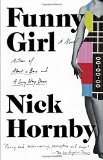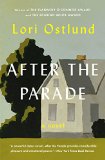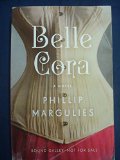Summary | Excerpt | Reading Guide | Reviews | Beyond the book | Read-Alikes | Genres & Themes | Author Bio

Growing up in Blackpool, in the North of England, Barbara Parker wanted nothing more than to be the UK's answer to Lucille Ball. "She was so serious about watching comedy on the television that people thought she was a bit odd…It was, she sometimes felt, a bit like being religious." Now a young woman in the 1960s, she works in a local department store and lives with her father; her mother left the family 10 years ago. As the novel opens, Barbara tries a sideways route to fame through the Miss Blackpool beauty pageant. Although she wins the title, her goals are much greater – and London is the only place for a budding actress.
When she moves to the City, she gets another department store job and comes in for incessant teasing due to her northern accent. However, by a stroke of luck she meets a theatrical agent and auditions for a new Comedy Playhouse show called Wedded Bliss? Barbara takes a stage name, Sophie Straw, and changes the mediocre script to suit her talents.
The creators agree to a spin-off show, a North versus South comedy called Barbara (and Jim). Ironically, the show will be distinctive for starring "Barbara from Blackpool," the very identity Sophie was trying to flee. The fictional BBC sitcom runs for four seasons and becomes a comedy classic, attracting 17 million viewers. The novel traces the show's chronological development through close third-person sections moving between the different people involved. Clive Richardson, Sophie's costar, has a bad track record with women (including, later on, a broken engagement to Sophie). Producer Dennis Maxwell-Bishop is caught in an unhappy marriage with an adulteress, while writers Bill Gardiner and Tony Holmes met in a police cell when both were arrested for separate homosexual incidents.
With Funny Girl, Hornby tries out a different setting for the first time; his six previous novels comment on their contemporary (1990s–2010s) setting. However (as he did especially well in High Fidelity and About a Boy), he is a pro at using popular culture to define a time period. The Swinging Sixties was a golden age for BBC comedy (see 'Beyond the Book'), and both the television industry and society as a whole were undergoing rapid changes. All the young women look like Twiggy, Hair introduces public nudity on stage, and Sophie meets one of the musicians of the Yardbirds at a club. A generation shift is underway.
In some ways Barbara (and Jim) symbolizes the transition from I Love Lucy's slapstick to more edgy relationship-based comedy. So although an early episode has Barbara attempting some plumbing and causing a flood, later episodes focus on the couple's marital troubles. The plot often comes uncomfortably close to home for writer Tony, a closeted homosexual married to a fellow BBC employee, June. The fictional Barbara and Jim have trouble consummating their marriage but delight in an unexpected pregnancy, just like Tony and June.
Changing legislation about homosexuality is an important part of the novel's background story. Homosexuality, still illegal at the time, was a black mark against Tony and Bill in the early 1960s, but later Bill is able to publish an explicitly homosexual novel through a fringe publisher. The novel takes the plot full circle to 2014 where views about homosexuality have progressed even more.
The book's title is not to be taken literally — this is one of Hornby's less humorous novels — but is borrowed from the Broadway play and subsequent 1968 movie, Funny Girl, which was based on the life of real-life movie star and comedienne, Fanny Brice. Hornby's novel might have sparkling dialogue, but it also has a more bittersweet, reflective tone overall. For me, Tony's was the most meaningful and noteworthy story, more so than Sophie's well-trodden rags-to-riches trajectory. Even though she is the title character, Sophie ends up fading into the background somewhat, with the show and, more generally, Britain's 1960s milieu taking center stage. With its focus away from contemporary times, this might not be vintage Hornby, but is a memorable evocation, nevertheless, of the Swinging Sixties in Britain.
![]() This review was originally published in The BookBrowse Review in March 2015, and has been updated for the
March 2016 edition.
Click here to go to this issue.
This review was originally published in The BookBrowse Review in March 2015, and has been updated for the
March 2016 edition.
Click here to go to this issue.

If you liked Funny Girl, try these:

by Lori Ostlund
Published 2016
From Flannery O'Connor and Rona Jaffe Award winner Lori Ostlund, a deeply moving and beautiful debut novel about a man who leaves his longtime partner in New Mexico for a new life in San Francisco, launching him on a tragicomic road trip and into the mysteries of his own Midwestern childhood.

by Phillip Margulies
Published 2014
A sweeping historical novel based on the extraordinary life and times of Belle Cora, the daughter of a New York merchant who went on to become a millworker, a prostitute, a notorious madam, a murderess, and eventually one of San Francisco's richest and most revered dowagers.
Your guide toexceptional books
BookBrowse seeks out and recommends the best in contemporary fiction and nonfiction—books that not only engage and entertain but also deepen our understanding of ourselves and the world around us.